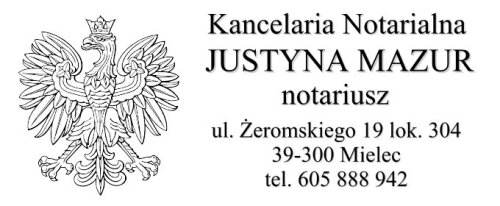Best Will & Testament Lawyers in Poland
Share your needs with us, get contacted by law firms.
Free. Takes 2 min.
Or refine your search by selecting a city:
List of the best lawyers in Poland
About Will & Testament Law in Poland
In Poland, Will & Testament law is guided by the Civil Code, which regulates the processes and principles surrounding the distribution of a person's estate after their death. A will is a legally binding document that specifies how an individual's properties and assets should be handled. Polish law strictly defines the form a valid will must take, which includes a handwritten document, a notarial will, or a will made in specific extraordinary circumstances. It's noteworthy that Polish inheritance law provides for statutory inheritance, meaning that, in the absence of a will, the estate is distributed according to a predefined order of relatives.
Why You May Need a Lawyer
Engaging a lawyer for matters of Wills & Testaments in Poland can be crucial in several situations. Legal assistance ensures that a will is correctly drafted to reflect the testator’s intentions and complies with statutory requirements, thus minimizing the possibility of contestation. A lawyer can also provide guidance in complex cases involving substantial assets or beneficiaries residing abroad. If disputes among heirs arise or if the estate involves business interests, a lawyer's expertise can be invaluable in resolving such complexities efficiently and legally.
Local Laws Overview
Polish inheritance law is subject to various statutory regulations that must be adhered to. Some key aspects include:
- Testament Forms: Wills can be written in various forms, including holographic (handwritten), orally declared before witnesses, or notarized.
- Statutory Inheritance: If no will is present, estate division follows a statutory order prioritizing the deceased's spouse and children.
- Legitimate Portion (zachowek): Certain heirs are entitled to claim a legitimate portion of the estate, even if the will stipulates otherwise.
- Renunciation: Heirs can renounce their rights to the inheritance through a statement made before the court.
- Inheritance Tax: Based on the relationship to the deceased, heirs may be obliged to pay inheritance tax under the Polish inheritance and donations tax law.
Frequently Asked Questions
1. What are the legal requirements for a will to be valid in Poland?
A will must be either entirely handwritten, signed, and dated by the testator, or notarized. Oral wills can only be made under exceptional circumstances.
2. Can I draft a will in Poland if I'm a foreign national?
Yes, foreign nationals can draft a will in Poland. It is recommended to adhere to Polish legal standards to avoid complications in execution.
3. Who can contest a will in Poland?
Potential heirs and those with a legal interest can contest a will on grounds such as lack of testamentary capacity or undue influence.
4. What happens if I die without a will in Poland?
If you die intestate (without a will), your estate is distributed based on the legal order of inheritance under Polish law, starting with the spouse and children.
5. Is it possible to disinherit an heir in Poland?
Yes, disinheritance can be specified in a will, but valid reasons must be clearly stated, complying with statutory requirements.
6. Can an existing will be changed or revoked?
Yes, a testator can change or revoke a will at any time before death by creating a new will or destroying the old one with intention to revoke.
7. How is the legitimate portion (zachowek) calculated?
The legitimate portion is typically half of what the statutory share would have been, or two-thirds if the heir is a minor or permanently unable to work.
8. Are there inheritance taxes in Poland?
Yes, inheritance tax applies, but close family members may be entitled to significant exemptions or reduced tax rates.
9. Can I include conditions in my will?
Conditions can be included, but they must not violate legal norms or public policy, as such conditions might render the will void.
10. How do international inheritances work?
International inheritances are subject to both Polish law and international agreements. Proper legal guidance is needed to navigate these complexities.
Additional Resources
Several resources can assist you in understanding Will & Testament matters in Poland:
- Ministry of Justice: Offers information about legal procedures and regulations regarding inheritance.
- Bar Associations: Local bar associations can help you find qualified lawyers specializing in inheritance law.
- Legal Aid Centers: Provide free or low-cost legal advice for individuals who qualify.
- Notarial Chamber: Helps ensure wills are properly notarized and advises on notarial processes.
Next Steps
If you need legal assistance regarding a Will & Testament in Poland, consider taking the following steps:
- Consult a specialized lawyer to discuss your situation and get tailored legal advice.
- Draft or review your will to ensure it complies with Polish legal standards.
- Address any potential disputes among heirs with professional legal mediation.
- Consider international legal advice if your estate or heirs are located abroad.
- Keep abreast of any changes in the law that might affect your estate planning.
Lawzana helps you find the best lawyers and law firms in Poland through a curated and pre-screened list of qualified legal professionals. Our platform offers rankings and detailed profiles of attorneys and law firms, allowing you to compare based on practice areas, including Will & Testament, experience, and client feedback.
Each profile includes a description of the firm's areas of practice, client reviews, team members and partners, year of establishment, spoken languages, office locations, contact information, social media presence, and any published articles or resources. Most firms on our platform speak English and are experienced in both local and international legal matters.
Get a quote from top-rated law firms in Poland — quickly, securely, and without unnecessary hassle.
Disclaimer:
The information provided on this page is for general informational purposes only and does not constitute legal advice. While we strive to ensure the accuracy and relevance of the content, legal information may change over time, and interpretations of the law can vary. You should always consult with a qualified legal professional for advice specific to your situation.
We disclaim all liability for actions taken or not taken based on the content of this page. If you believe any information is incorrect or outdated, please contact us, and we will review and update it where appropriate.
Browse will & testament law firms by city in Poland
Refine your search by selecting a city.

















